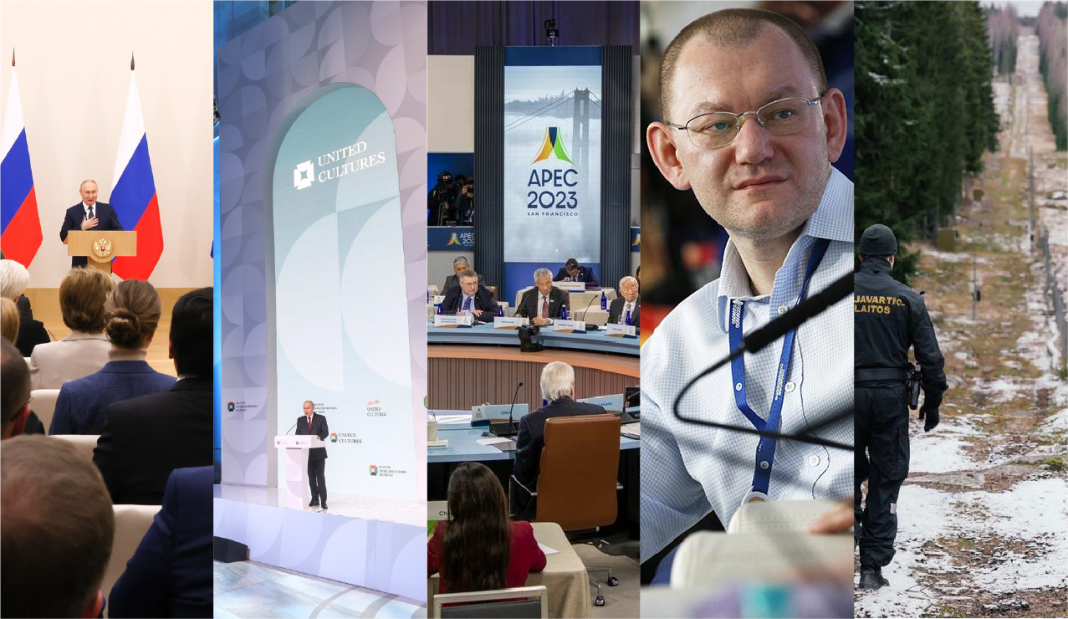This report describes the key events that significantly impacted Russia’s political, economic, and social processes.
Based on the results of the past week, the following trends can be summarised:
- Despite the absence of an official nomination of Putin’s candidacy for the presidential elections, his election campaign began in mid-summer. The number of forums and other similar formats of public meetings at which Putin makes presentations and conducts discussions has recently gone through the roof. This approach demonstrates two main factors. Firstly, Putin is trying in every possible way to show that he is not isolated from the outside world and can even meet with European or Western politicians. Secondly, he gradually becomes a showman who spends all his free time on public discussions and outright populism. Thus, he begins to imitate Donald Trump, who also prefers public speaking and loud statements.
- Many expected that within the framework of the APEC summit, the leaders of China and the United States would be able to agree on a shared vision of the issues of the two most pressing “hot spots” – Ukraine and the Middle East. China could (theoretically) influence Russia, and the United States could influence Ukraine, pushing the parties to negotiate. However, this apparently did not happen. In any case, the non-inclusion of the issues of Ukraine and the Middle East in the final declaration does not mean that the parties are inclined to deepen confrontation. There is hope that a four-hour personal meeting between Xi Jinping and Joe Biden could mark the beginning of more dynamic work towards a peaceful resolution of controversial and hot issues.
- Russia decided to use against Finland the practice tested in Belarus two years ago, when the Belarusian authorities, in every possible way, encouraged illegal migrants from Kurdistan and the Middle East to storm the Polish and Lithuanian border, creating increased nervousness among the border guards of Poland and Lithuania. Thus, Russia decided to punish Finland, which not only took a principled position on issues of Russian aggression against Ukraine but also joined NATO.
This report highlights the following topics that were most relevant for Russia during 13th-19th of November:
1. Meeting of Vladimir Putin with representatives of Russian election commissions;
2. Plenary session of the Forum of United Cultures;
3. The Golden Gate Declaration of APEC 2023 Economic Leaders;
4. Vladimir Putin’s meeting with permanent members of the Security Council;
5. Appointment of Andrei Yarin as head of the prospective Kremlin’s candidate election headquarters;
6. The situation on the Russian-Finnish border.
This Content Is Only For Subscribers
- Meeting of Vladimir Putin with representatives of Russian election commissions
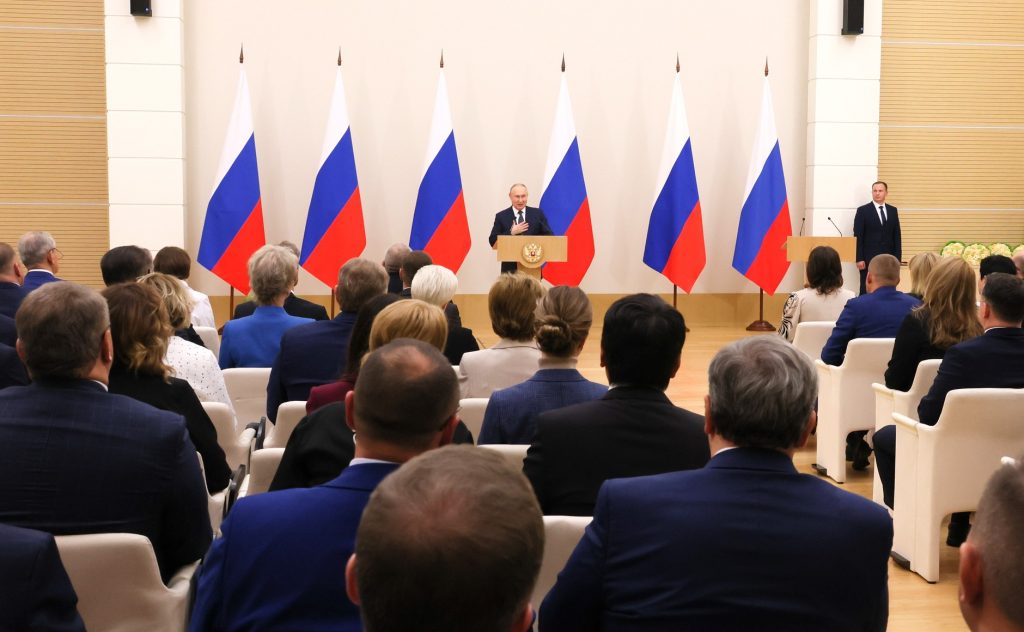
On Wednesday, November 15, at the residence of the Russian President in Novo-Ogaryovo, Vladimir Putin met with members of the Central Election Commission and heads of regional election commissions of the Russian Federation. This event was dedicated to the 30th anniversary of the country’s electoral system. Putin presented state awards to representatives of election commissions and also made an official address to the meeting participants.
Key theses:
- “I would like to immediately emphasise that election commissions are, of course, the most important state institutions because government bodies in our country are elected by citizens in direct elections, in conditions of high competition. Therefore, the transparent organisation of elections and their open, fair, legally verified process are essential, if not decisive, from the point of view of maintaining internal political stability, both for the legitimacy of the elected government and for strengthening people’s confidence in the voting results.”
- “Currently, there are more than 20 electronic services on government services and the Central Election Commission portals. They provide a qualitatively new level of accessibility and transparency of electoral procedures and are no longer perceived as an innovation but as the usual electoral standards of Russia.”
- “The use of modern standards by election commissions has allowed us to increase confidence in both the elections and the electoral system itself significantly. All sociological studies confirm this. Thus, following the results of a single voting day in 2020, 60% of VTsIOM respondents said they trusted the election results. In September 2022, 69 per cent believed that the elections in their region were generally fair, without serious violations.”
Outcomes and outlook:
In fact, Russia is starting the presidential election campaign. On the eve of the start of the elections, Putin needed to demonstrate that the Central Election Commission and the commissions in the regions are an obedient mechanism that will give the results that the authorities require. You should not expect surprises: the Central Election Commission will acknowledge the victory of the one determined by Putin, with the result that will be agreed in advance with the Administration of the President of the Russian Federation.
- Plenary session of the Forum of United Cultures
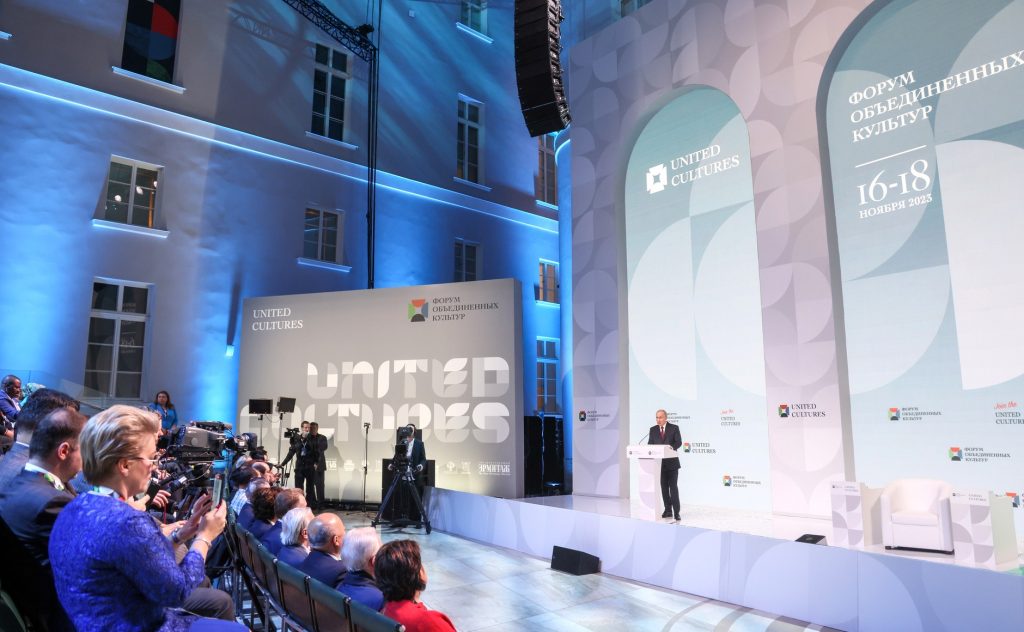
On Friday, November 17, Vladimir Putin participated in the IX St. Petersburg International Forum of United Cultures plenary meeting. The event took place on November 16-17 and brought together participants from different countries and fields of activity. The forum’s organisers were the Russian Federation’s government, the Ministry of Culture of the Russian Federation, and the government of St. Petersburg. Deputy Prime Minister Tatyana Golikova heads the organising committee of the forum.
Key points from Putin’s speech:
- “We are sure: the future is in the free, multi-linear and diverse development of cultures, in the broadest dialogue between humanitarian communities of the multipolar world, which is being born today.”
- “One of the key discussion topics was learning history through culture. It should be noted, and this is an obvious thing, that archives, documentary evidence of events, and primary sources today seem to be available to everyone – well, firstly, not to everyone, and secondly, mostly specialists and professionals work with them. Most people get knowledge about the past from books, cinema, theatre, painting, and music, and the truth about history, about the most complex pages of the past, is, of course, provided by masterpieces of world culture – Russian, European, American, Chinese, Indian, Arab and many others.”
- “Despite all the bans and sanctions, art still knows no boundaries. It has always been so, it is so, and it will be so, of course, especially in our time of rapid technological progress, which creates colossal opportunities but also new risks. We must calculate the consequences of these fundamental tectonic processes, achievements of genetics, quantum mechanics, artificial intelligence technologies, and other innovative areas.”
- “Russia and our people are deeply responsible for preserving world heritage and traditional values. Our national character includes indifference to the pain of others, the desire for justice, and concern for preserving our common property; I mean now the Russian language.”
- “Russia will chair two international associations simultaneously next year – BRICS and the CIS. A large cultural program is planned. We also lean on building up cultural and humanitarian cooperation with the states of the Shanghai Cooperation Organization, ASEAN, and leading regional associations of Africa and Latin America.”
- “Russia is committed to working closely with everyone who shares our values of peace, friendship and mutual respect, who is ready to take part in forming a modern multipolar world based on civilizational and cultural diversity.”
- “Who will build the bridges? The military has difficulty doing this, and politicians have mutual claims, grievances, ambitions, and the struggle for their political future – constant struggle and fighting. Only smart cultural figures think about the future and build bridges.”
- “Indeed, we see that at all kinds of competitions in Western countries, to win something, you need to either tell, write, or show the life of sexual minorities, transgender people and some other transformers – many different names.”
- “But here’s what I’d like to say: I’ll say something unexpected. And they, too, these topics and these people, have the right to win, show, tell, because this is also part of society. This is also what people live by. It’s bad if they only win all sorts of competitions; that’s useless. But this is the desire for equality, which, in my opinion, the Minister of Culture of the Republic of South Africa spoke about. This equality should be everywhere, in everything, including in competitions in the field of culture.”
- “Slavic culture is an integral part of European and world culture and is bright and original. Of course, just like Russian culture, it is impossible to abolish it and pretend it does not exist.”
- “Yesterday, the Chairman of the Government reported with pride: over the past month, our economy has grown by 5.5 per cent of GDP. Each year, it will be over 3. We carefully said this all the time: it will be 2.7, 2.5, 2.8 [per cent]. Now we confidently say: there will be over 3. Now, I will not say as in European countries so that it does not look like some kind of arrogance and boasting. But we have many problems.”
- “We are having difficult times with the European elites, who have lost their sense of national identity and, in my opinion, have become so dependent on other countries, primarily North America, which does not allow them to realise the main thing for which their people elected them – to protect interests of their own countries and peoples. That’s the problem. This is the current tragedy of Europe. This is an obvious thing.”
- “Otherwise, how can one calmly look at the fact that, say, in the States, laws are being passed that lure entire huge enterprises, almost industries, from Europe, which are forced to move and open their production there? How can one agree with this? And my European colleagues agree – as a rule, not all of them. But those who disagree are subjected there, to put it mildly, to criticism that they do not adhere to some general line.”
- “I will not now describe the entire background of Russian-Chinese relations. They are truly unique today and, probably, in the history of our countries, have never reached such heights and such quality; I mean the level of trust that has developed between our states. We demonstrate a very high level of cooperation in all important areas.”
Outcomes and outlook:
Putin’s speech at the Forum of United Cultures is programmatic in nature and determines the humanitarian policy of the Russian Federation for the near future. The new concept will be based on traditionalism, multiculturalism and the export of Russian culture to the countries of the Global South. Criticism of tolerance towards LGBT people, trolling Europe, and demonisation of the United States remain relevant elements of Russian policy. Another goal of Putin’s speech is to show that “we are stronger than ever”: the appeal to problems in the EU and to GDP growth in Russia, as well as the mention of successes in promoting Russia’s interests in Africa, are indicative.
At the same time, it is essential to note that despite the absence of Putin’s official candidacy for the presidential election, his election campaign began in mid-summer. The number of forums and other similar formats of public meetings at which Putin makes presentations and conducts discussions has recently gone through the roof. This approach demonstrates two main factors. Firstly, Putin is trying in every possible way to show that he is not isolated from the outside world and can even meet with European or Western politicians. Secondly, he gradually becomes a showman who spends all his free time on public discussions and outright populism. Thus, he begins to imitate Donald Trump, who also prefers public speaking and loud statements.
- The Golden Gate Declaration of APEC 2023 Economic Leaders
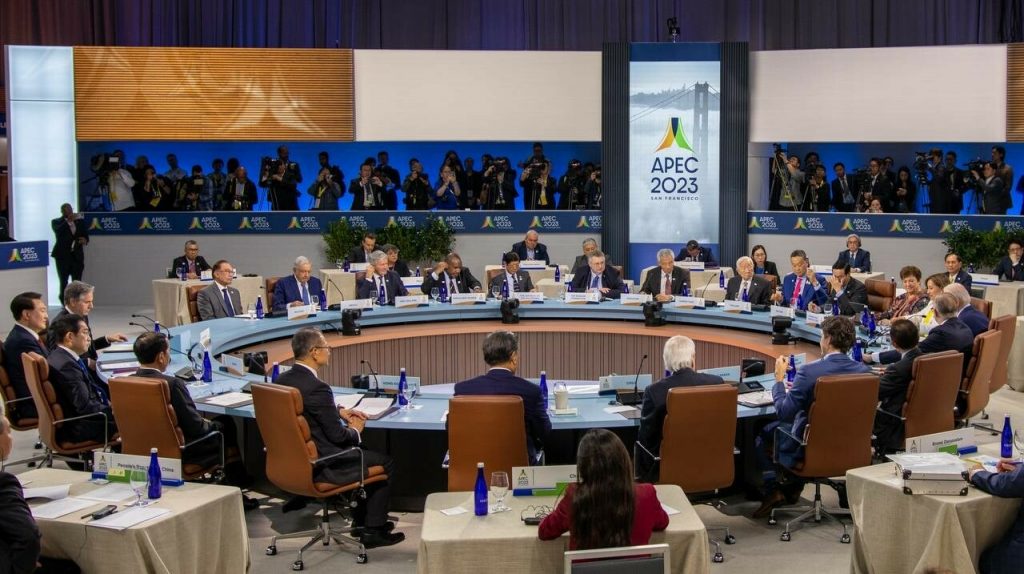
The annual APEC summit was held in San Francisco from November 11 to 17. The main events of the 2023 summit can be considered the meeting between Joe Biden and Xi Jinping, as well as the joint decision of the participants to reform the World Trade Organization. Otherwise, there were no fundamental changes following the summit. This year, at the APEC summit, Russia was represented by Deputy Prime Minister Alexei Overchuk, who is included in various Western sanctions lists, including the European Union, but is not under US sanctions, unlike most of the top leadership of the Russian Federation. Also, at the APEC summit, participants signed a joint Golden Gate Declaration, which did not represent a joint position on the situation in Ukraine and Gaza.
Key theses of the joint declaration:
- “We must use technological and economic advances further to unlock our region’s enormous potential and significant progress, accelerate economic growth, and find answers to the full range of environmental challenges, including climate change.”
- “We reaffirm our resolve to ensure a free, open, fair, non-discriminatory, transparent, inclusive and predictable trade and investment environment. We also reaffirm the importance of the rules-based multilateral trading system, with the World Trade Organization (WTO) playing a central role, which continues to drive exceptional growth for our region. We are committed to implementing the necessary reform of the WTO to improve all its functions, including discussions to ensure a fully functioning and effective dispute settlement system available to all its members by 2024.”
- “We will continue working to create equal conditions for all to create a favourable trade and investment environment. We reaffirm our commitment to accelerate work in response to the midterm review of the APEC Roadmap for Services Competitiveness to complete its implementation by 2025.”
- “We remain committed to improving all our people’s quality of life and building a resilient and sustainable future for all. To achieve this, we will further promote and support gender equality, as well as economic inclusion and empowerment of micro, small and medium enterprises (MSMEs), workforce, women, youth, as well as other groups with untapped economic potential, such as indigenous peoples, as appropriate, people with disabilities, residents of remote and rural communities.”
- “Recognising the detrimental impact of corruption on economic growth and development, we are committed to taking practical measures and a common approach to work together to combat cross-border corruption and eliminate safe havens for corrupt individuals and their illicit assets. We welcome work throughout this year on this topic.”
Outcomes and outlook:
The decision to invite the Russian delegation to San Francisco was made about a month before the opening of the APEC summit. Alexey Overchuk, who heads the Russian delegation (a native of Korostyshev, Zhytomyr Oblast), is perhaps the only Russian Government member allowed to enter the United States. He is the “right hand” and “shadow” of Mikhail Mishustin, coming from among tax officials and the most trusted representative of the head of the Government. The Russian delegation was not expected to influence the course of the summit significantly. Still, at the same time, Russia has been actively defending its interests in the Pacific Ocean region and the Far East for a long time, so its position was also considered.
It is clear that Russia stands in solidarity with China on many topics and areas, so Russian-Chinese cooperation should be considered as a single position in the region (the differences are absolutely minimal and conditional). The main attention during the summit was focused on the meeting between the leaders of the United States and China; all other topics seemed secondary against this background.
Many expected that the leaders would be able to agree on a shared vision of the issues of the two most pressing “hot spots” – Ukraine and the Middle East. China could (theoretically) influence Russia, and the United States could influence Ukraine, pushing the parties to negotiate. However, this did not happen. In any case, the non-inclusion of the issues of Ukraine and the Middle East in the final declaration does not mean that the parties are inclined to deepen confrontation. There is hope that a four-hour personal meeting between Xi Jinping and Joe Biden could mark the beginning of more dynamic work towards a peaceful resolution of controversial and hot issues. Even despite the insult Biden inflicted on Xi Jinping after the meeting itself.
- Vladimir Putin’s meeting with permanent members of the Security Council
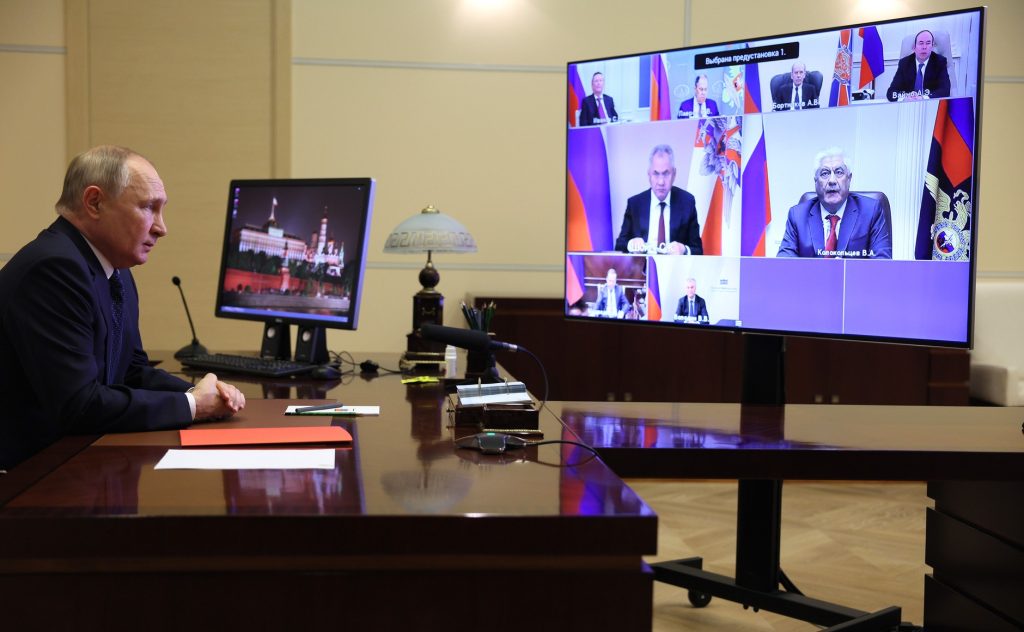
On Thursday, November 16, Vladimir Putin held an operational meeting via videoconference with permanent members of the Russian Security Council. According to official data, the main topic of the meeting was the results of several major international events. A few essential for the country’s life decisions were taken based on them. The main speaker at the meeting was Minister of Foreign Affairs Sergei Lavrov.
The meeting was attended by Chairman of the State Duma Vyacheslav Volodin, Deputy Chairman of the Security Council Dmitry Medvedev, Head of the Presidential Administration Anton Vaino, Minister of Internal Affairs Vladimir Kolokoltsev, Minister of Foreign Affairs Sergei Lavrov, Minister of Defense Sergei Shoigu, Director of the Federal Security Service Alexander Bortnikov and the special representative of the President on issues of environmental protection, ecology and transport Sergey Ivanov.
Outcomes and outlook:
The Security Council of the Russian Federation is increasingly acquiring the features of the leading advisory body, a kind of “Politburo” under Putin. Meetings have become frequent and systematic. In this situation, the Security Council was necessary to determine the new coordinates in which Russia finds itself due to the latest geopolitical shifts – based on the results of important world summits over the past two months.
This meeting is important for forming plans for the next year and the near future.
- Appointment of Andrei Yarin as head of the prospective Kremlin’s candidate election headquarters
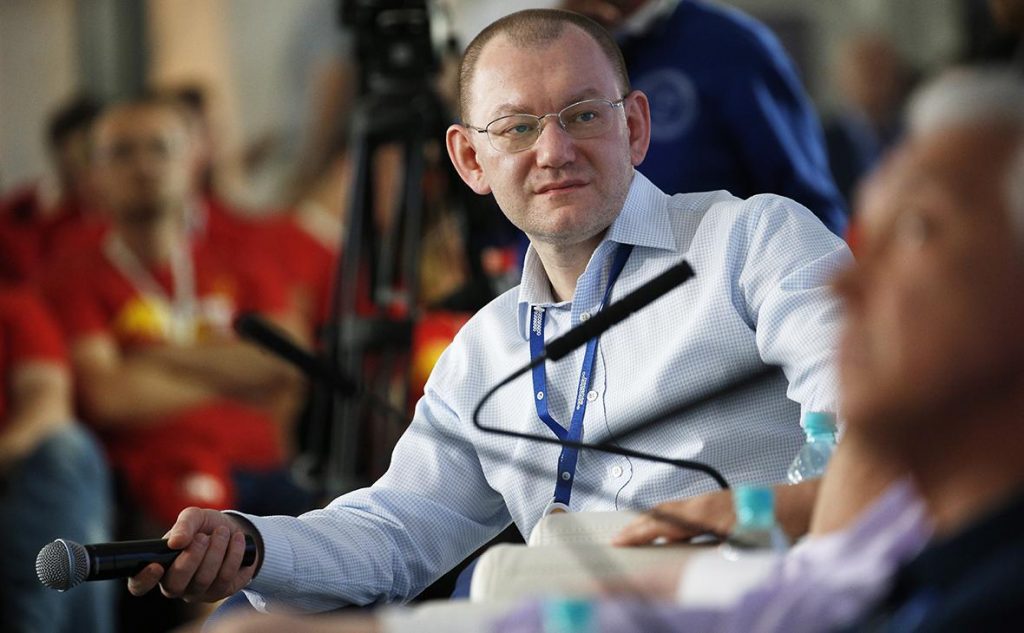
On Tuesday, November 14, the Russian publication RBC, citing several sources in the Kremlin, stated that the official election headquarters of Vladimir Putin in the upcoming elections will be headed by the head of the Kremlin’s Domestic Policy Department, Andrei Yarin, who was responsible for the work of Putin’s headquarters in 2018. However, it is essential to note that Putin has not officially announced his candidacy for the upcoming elections, which has already given rise to many theories and assumptions. In this case, it would be more appropriate to note that Andrei Yarin will most likely lead the election headquarters of the Kremlin candidate (even if a decision is made to nominate a new candidate instead of Putin).
Outcomes and outlook:
In the previous presidential elections, Vladimir Putin’s headquarters was headed by Sergei Kiriyenko. Yarin is believed to be a person from Kiriyenko’s team, which means: a) Kiriyenko will remain the real chief of staff, and b) Yarin can expect rapid career growth. Yarin is known as an adamant manager who knows how to “break through the knee.” In fact, for a long time, he was one of the primary supervisors of domestic policy in the Russian Federation. Therefore, the main emphasis will be not on technology (Kiriyenko’s methods) but on mobilising the federal districts’ vertical chain of governors and presidential representatives. In circumstances where the headquarters will be led by Yarin, the success of not only Putin can be guaranteed but also any person whom Putin points to (if, at the last moment, he decides to find a successor for himself).
At the same time, according to available information, the shadow election headquarters should be headed (or has already been led) by the head of the Office of the President of the Russian Federation to ensure the activities of the State Council, Alexander Kharichev. Like Yarin, Kharichev is Kiriyenko’s man and has enormous experience in successful election campaigns (Ascolta wrote more about him here). Kharichev may be responsible for technics and all “black” technologies that should not be entrusted to the main headquarters.
- The situation on the Russian-Finnish border
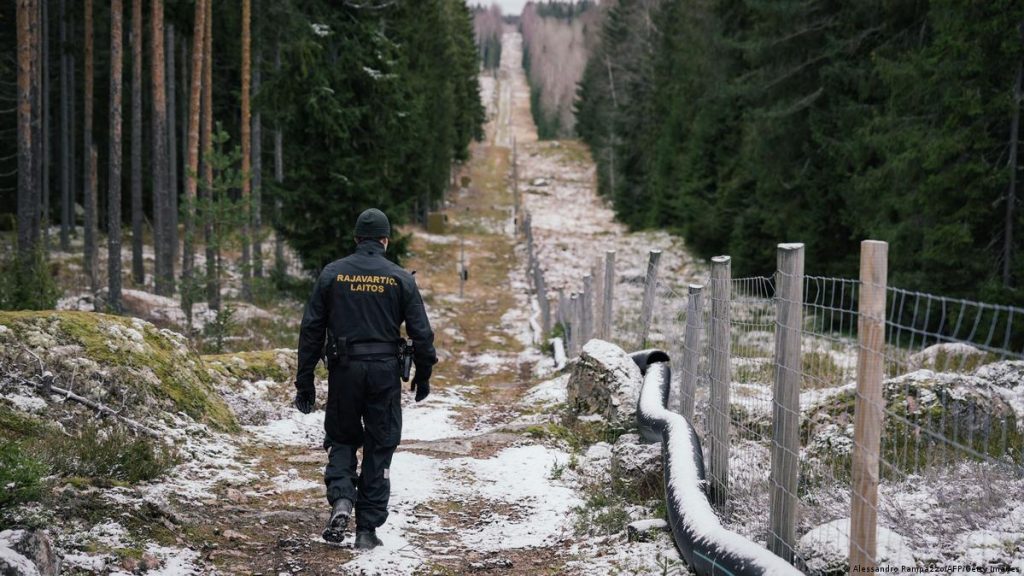
On Thursday, November 16, Finnish Interior Minister Marie Rantanen announced that the border crossing points of Vaalimaa, Nuijamaa, Imatra and Niirala on the border between Finland and Russia would cease to operate on Saturday night. According to the official, they will close at least February 18, 2024. Officially, such measures are being introduced due to the influx of third-world migrants. The remaining checkpoints on the Finnish-Russian border will continue to operate as usual. There are nine checkpoints on the ground border between Finland and Russia.
A day before the closure of four land checkpoints, 163 asylum seekers were reported to have arrived at Finland’s south-eastern border. This number is significantly higher than in previous days. So, on November 16, 26 people who asked for asylum arrived at the border of Finland and Russia, and on November 15 there were 75 of them. A day earlier, 50 asylum seekers arrived at the border. Since the start of 2023, 335 asylum claims have been filed at the south-eastern border, according to official data. At the same time, in the last week alone, according to the Finnish border service, about 300 asylum seekers arrived in the country, mainly from Iraq, Yemen, Somalia and Syria.
Outcomes and outlook:
Russia decided to use the Belarussian proved practice against its obstinate neighbours. Two years ago, Belarusian authorities encouraged illegal migrants from Kurdistan and the Middle East to storm the Polish and Lithuanian border in every possible way, increasing nervousness among the Polish and Lithuanian border guards. This time, Russia decided to punish Finland, which not only took a principled position on issues of Russian aggression against Ukraine but also joined NATO.
The situation on the border with Finland is “proxy aggression”: attempts to violate the state border are being made not by Russian citizens but by citizens of third countries, and if as a result of either the actions of the border guards or the severe frosts that hit Russia, there will be victims among illegal migrants and refugees, this could lead to unpleasant scandals and pressure from several international CSOs, and will also give additional cards to the hands of Russian diplomats (“the bestial grin” of Western Europe, which has shown its face and its attitude towards citizens of “third countries”). Judging by the actions taking place mainly in Karelia, the operation was developed directly by the Secretary of the Security Council of the Russian Federation, Nikolai Patrushev, who has controlled this region as a “patrimony” for several decades.

